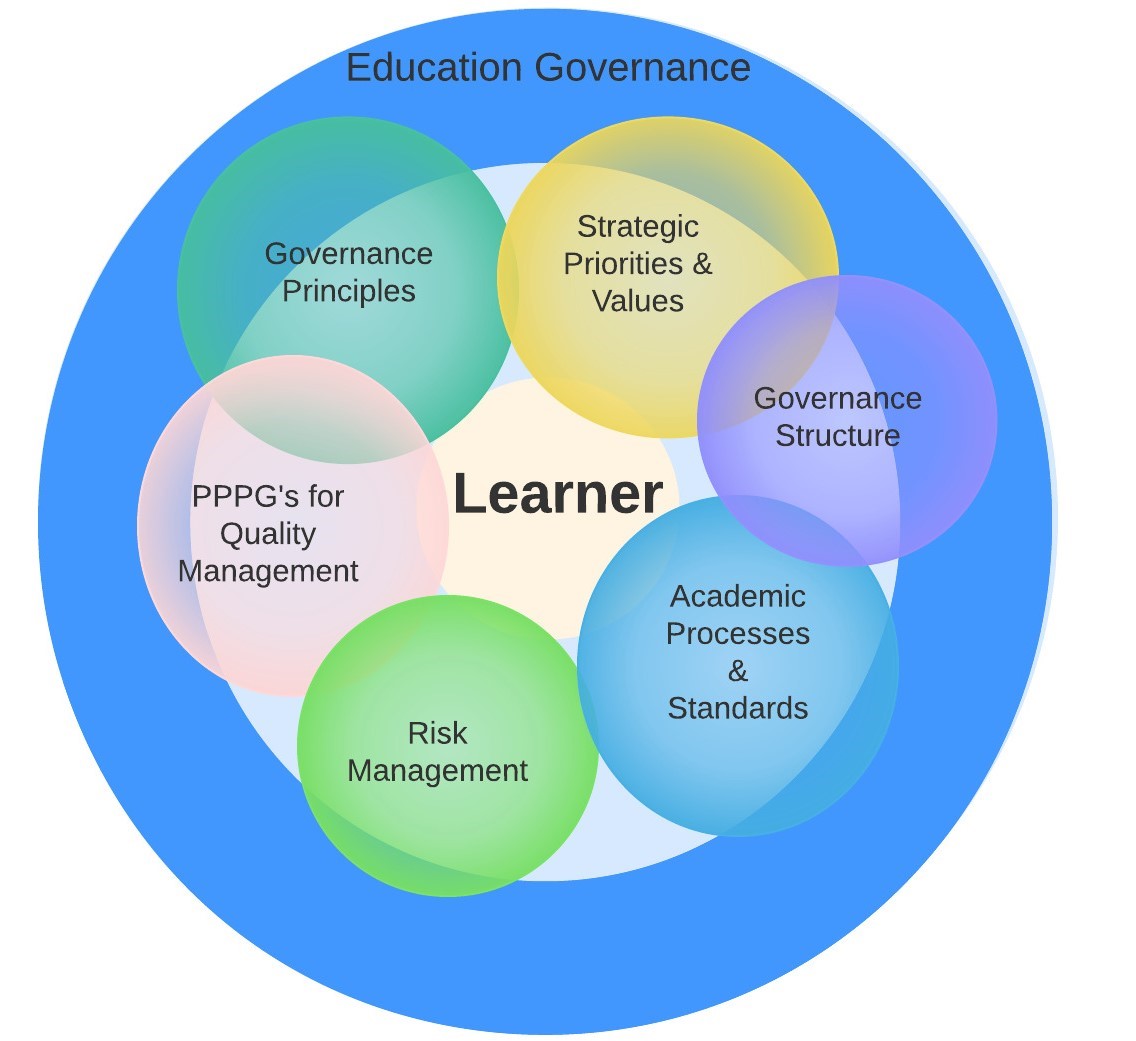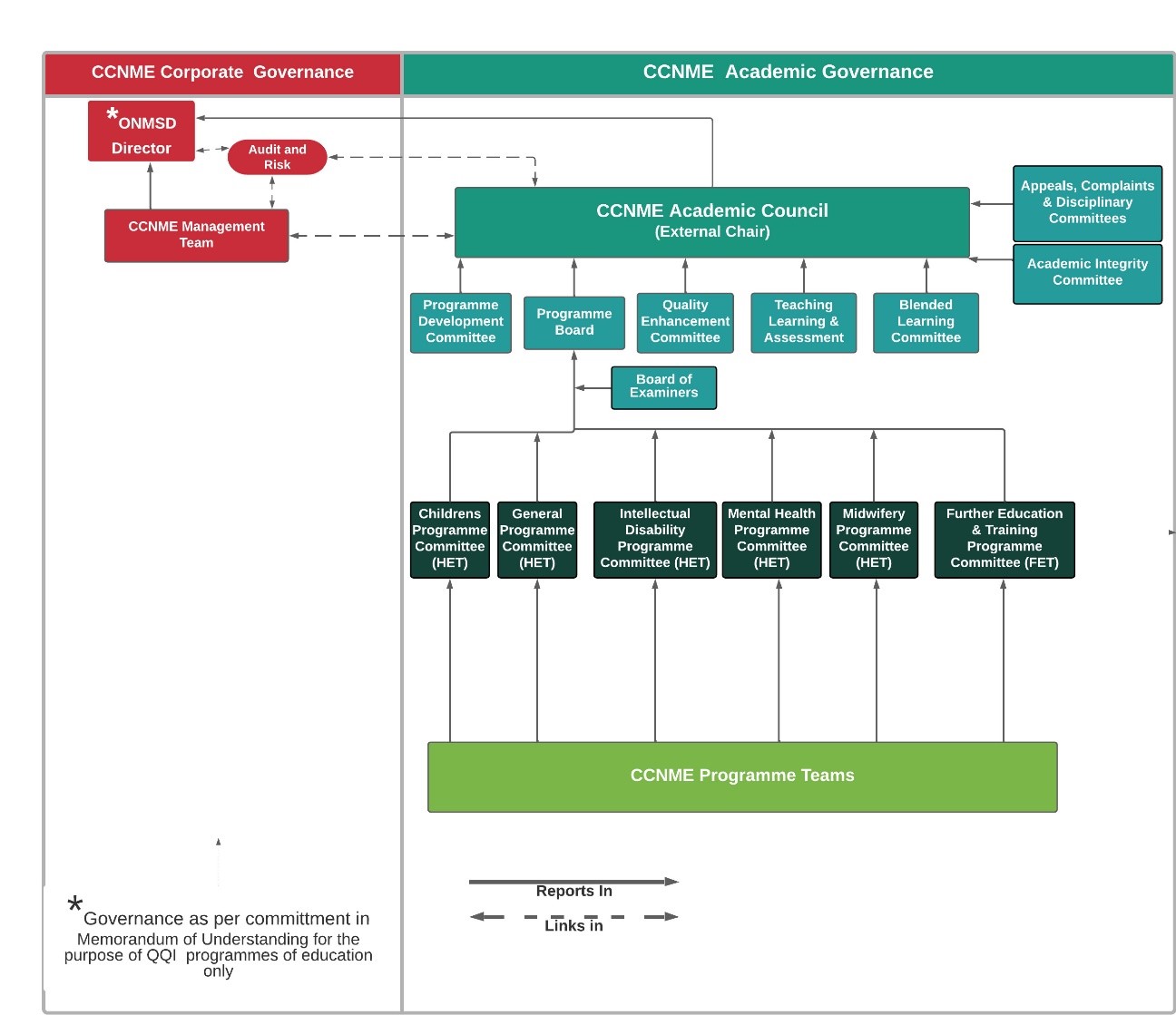CCNME Education Governance Framework
The Education Governance Framework (2020) was developed to provide assurance to all stakeholders that education provided by the CCNME is grounded in principles that embed quality, accountability, and a culture of continuous improvement.
The Framework comprises six inter-related elements placing the learner at the centre as illustrated by Figure 1. below. By ensuring appropriate alignment of education with corporate, nursing and midwifery values and service priorities, educational governance processes will support the development and delivery of appropriate and responsive education

Figure 1 Education Governance Framework (2020)
Governance Principles
The educational governance principles set out to seek assurance that educational services are fully aligned with the HSE organisational values and strategic priorities and are underpinned by nursing and midwifery values:
- Ensuring the integrity of the educational and learning processes.
- Providing accountability and responsibility for the educational system to stakeholders.
- Promoting the continuous improvement of the learning process.
- Enhancing educational outcomes and consequent improvement of services and patient care.
- Responses to service needs that are timely, effective and within available resources/allocated budget.
- Working in partnership with key stakeholders.
- Evidence-based and quality assured frameworks for all developments.
- A risk management approach to quality improvement, with clear action plans and transparent reporting processes.
Learner
The CCNME values the learner’s voice and recognises the importance of eliciting the learner experience to determine, and enhance the quality of academic standards, continually building on providing a reputable quality learning experience for all learners. Active participation of learner representatives on academic committees is encouraged to reflect learner views and interests and promotes awareness amongst learners of the academic governance.
Governance Structure
The CCNME Governance Structure in relation to QQI programmes of education is presented in Figure 2. The separation between CCNME Academic Governance and CCNME Corporate Governance is clearly defined.
Figure 2 Education Governance Structure
Director of the Office of the Nursing & Midwifery Services Director (ONMSD)
The Director of the ONMSD provides oversight of the Management Team and Academic Council and the implementation of the ONMSD strategic plan and other agreed strategies where it applies to QQI validated programmes of education for registered nurses, registered midwives and health care assistants and those who support the nursing and midwifery function.
The ONMSD Director reports to the National Director, Clinical Programme Implementation & Professional Development, Office of the Chief Clinical Officer, HSE.
CCNME Corporate Governance
Management Team
Corporate Governance of the CCNMEs is provided by the Management Team who report to the ONMSD.
CCNME Management Team Terms of Reference (PDF, size 491.3 KB)
Audit & Risk Committee
The Office of the Nursing and Midwifery Service Director has established an Audit and Risk Committee as an advisory Committee of the Management Team to maintain oversight and ensure the integrity of the CCNME governance, internal audit, financial controls, reporting, risk management associated with QQI programmes of education only and the measures taken to mitigate those risks.
CCNME Audit and Risk Terms of Reference (PDF, size 489 KB)
CCNME Academic Governance
Academic governance incorporates the structures and processes that co-exist to standardise the conduct and overall management of teaching and learning in the CCNME, thus ensuring maintenance of standards, monitoring and continuous quality improvement. The ONMSD delegates authority on academic matters to the Academic Council.
Academic Council
The Academic Council has delegated authority for autonomous decision-making concerning all academic matters as they relate to QQI programmes of education.
CCNME Academic Council Constitution & Standing Orders (PDF, size 613.9 KB)
To fulfil the role and function of the Academic Council the following committees have been established with specific functions and delegated authority for decision-making:
- Academic Integrity - CCNME Academic Integrity Committee Terms of Reference (PDF, size 497.7 KB, 3 pages)
- Appeals - CCNME Appeals Committee Terms of Reference (PDF, size 481.6 KB, 2 pages)
- Blended Learning - CCNME Blended Learning Committee Terms of Reference (PDF, size 500.2 KB, 3 pages)
- Complaints - CCNME Complaints Committee Terms of Reference (PDF, size 485.3 KB, 3 pages)
- Disciplinary - CCNME Disciplinary Committee Terms of Reference (PDF, size 474.5 KB, 3 pages)
- Programme Board - CCNME Programme Board Terms of Reference (PDF, size 508.3 KB, 4 pages)
a) Board of Examiners - CCNME Board of Examiners Terms of Reference (PDF, size 497.7 KB, 4 pages)
b) Programme Committees (HET & FET) - CCNME Programme Committee Terms of Reference (PDF, size 494 KB, 3 pages)
c) Programme Teams - CCNME Programme Team Terms of Reference (PDF, size 487.3 KB, 3 pages) - Programme Development - CCNME Programme Development Committee Terms of Reference (PDF, size 592 KB, 3 pages)
- Quality Enhancement - CCNME Quality Enhancement Committee Terms of Reference (PDF, size 505.4 KB, 4 pages)
- Teaching Learning and Assessment - CCNME Teaching Learning and Assessment Committee Terms of Reference (PDF, size 500.3 KB, 3 pages)
Academic Processes and Standards
A range of processes for the management, assurance and control of educational quality pertaining to QQI programmes only is in operation. These are designed to provide the learner, QQI and NMBI with maximum assurance about quality management, risk management and quality improvement in relation to QQI validated programmes of education.
Risk Management
Making informed, transparent decisions and managing risk are essential elements of good governance within the HSE. There is a rigorous and transparent process in place in relation to strategic decisions and this is supported by good quality information, advice and support.
In relation to risk, an Audit and Risk Committee is established for the purpose of QQI accreditation to have an effective risk management system in operation.
Policies, Procedures, Protocols and Guidelines (PPPGs)
A Quality Assurance (QA) system has been developed to demonstrate a consistent clear approach to the development, approval, maintenance, implementation and evaluation of PPPGs utilised in the CCNME. As new policies are developed or existing policies are amended they shall adhere to the current HSE National Framework for Developing PPPGs.

